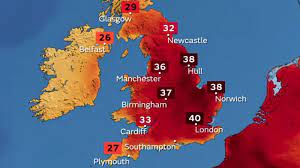
Are UK Summers getting warmer?
UK Summers Experience Rising Temperatures, Indicating a Trend Towards Hotter Climates
Recent data and weather patterns suggest that the United Kingdom is witnessing a consistent increase in summer temperatures, raising concerns about the long-term impact of climate change on the region. The UK’s traditionally mild and changeable summer climate is being challenged by a string of exceptionally hot seasons, pointing towards a significant shift in weather patterns.
Meteorological records from various sources,
including the UK Met Office, reveal a clear trend of rising temperatures during the summer months. The data indicates that over the past two decades, the UK has experienced a noticeable increase in the frequency and intensity of heatwaves, leading to prolonged periods of hot and dry weather.
One of the most remarkable examples was the scorching summer of 2018, where the UK faced one of the longest and hottest heatwaves in its history. The summer of 2019 followed suit, with record-breaking temperatures and extended dry spells. While 2020 and 2021 exhibited more moderate conditions, the summer of 2022 renewed concerns as the UK grappled with another blistering heatwave.
Experts point to climate change as a key driver behind the intensifying heat. Rising global temperatures due to greenhouse gas emissions have a direct impact on regional climates, including the UK. Though a single hot summer does not necessarily indicate a long-term trend, the repetition of such events aligns with climate change projections and raises concerns about the future.
Climate scientists
Furthermore, studies conducted by climate scientists indicate that the United Kingdom is expected to witness more frequent and severe heatwaves in the coming decades. These heatwaves not only pose immediate risks to human health and well-being but also have broader implications for agriculture, water resources, and the environment.
The consequences of hotter summers are already evident across various sectors. The agricultural industry faces challenges as heat and drought affect crop yields and livestock. Water shortages become more pronounced, and ecosystems suffer as lakes and rivers dry up, endangering wildlife and biodiversity. Additionally, the increased demand for cooling during heatwaves puts strain on energy infrastructure, leading to potential power shortages and rising energy costs.
In response to these challenges, the UK government has acknowledged the importance of climate action and committed to reducing greenhouse gas emissions. They have set ambitious targets to achieve net-zero emissions by 2050 and are implementing policies to promote renewable energy, sustainable transportation, and energy efficiency.
Adapting to the changing climate is crucial, and individuals can play their part by embracing sustainable practices such as conserving water, reducing energy consumption, and supporting initiatives aimed at combating climate change.
As the UK continues to experience hotter summers and faces the growing impacts of climate change, it is essential for society to act collectively and proactively to mitigate further temperature rises and ensure a sustainable future for generations to come.








This Post Has 0 Comments